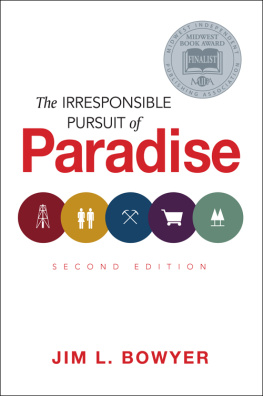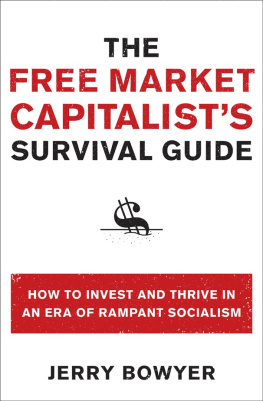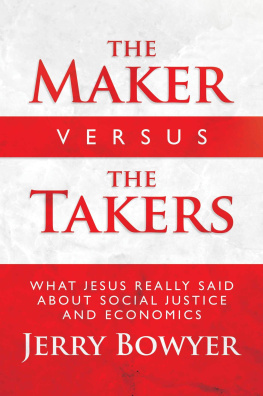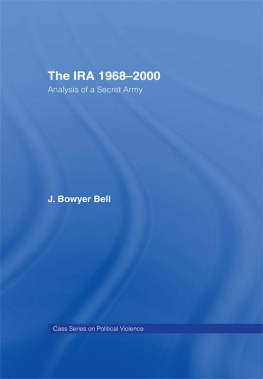Bowyer - The Irresponsible Pursuit of Paradise
Here you can read online Bowyer - The Irresponsible Pursuit of Paradise full text of the book (entire story) in english for free. Download pdf and epub, get meaning, cover and reviews about this ebook. City: Saint Paul;Minnesota, year: 2017, publisher: Levins Publishing, genre: Romance novel. Description of the work, (preface) as well as reviews are available. Best literature library LitArk.com created for fans of good reading and offers a wide selection of genres:
Romance novel
Science fiction
Adventure
Detective
Science
History
Home and family
Prose
Art
Politics
Computer
Non-fiction
Religion
Business
Children
Humor
Choose a favorite category and find really read worthwhile books. Enjoy immersion in the world of imagination, feel the emotions of the characters or learn something new for yourself, make an fascinating discovery.
- Book:The Irresponsible Pursuit of Paradise
- Author:
- Publisher:Levins Publishing
- Genre:
- Year:2017
- City:Saint Paul;Minnesota
- Rating:5 / 5
- Favourites:Add to favourites
- Your mark:
- 100
- 1
- 2
- 3
- 4
- 5
The Irresponsible Pursuit of Paradise: summary, description and annotation
We offer to read an annotation, description, summary or preface (depends on what the author of the book "The Irresponsible Pursuit of Paradise" wrote himself). If you haven't found the necessary information about the book — write in the comments, we will try to find it.
A leading environmentalist says, Contrary to common practice today, high consuming nations need to be asking, Why not in my back yard?
Bowyer: author's other books
Who wrote The Irresponsible Pursuit of Paradise? Find out the surname, the name of the author of the book and a list of all author's works by series.
The Irresponsible Pursuit of Paradise — read online for free the complete book (whole text) full work
Below is the text of the book, divided by pages. System saving the place of the last page read, allows you to conveniently read the book "The Irresponsible Pursuit of Paradise" online for free, without having to search again every time where you left off. Put a bookmark, and you can go to the page where you finished reading at any time.
Font size:
Interval:
Bookmark:
OF PARADISE
SECOND EDITION
OF PARADISE
SECOND EDITION
2016, 2017 Jim L. Bowyer
All rights reserved.
No part of this book may be reproduced, stored in a retrieval system or transmitted in any form or by any means: electronic, electrostatic, magnetic, tape, mechanical photocopying, recording or other wise without the written permission of the Publisher.
Composition by Bookmobile Design and Digital Publisher Services,
Minneapolis, MN
Levins Publishing
For individual orders go to: www.JLBowyer.com
ISBN: 978-0-9976726-1-9
Ebook ISBN: 978-0-9976726-2-6
Second edition
Library of Congress Control Number: 2017944402
Printed in the United States
If we are concerned about our great appetite for materials, it is plausible to decrease waste, to make better use of stocks available, and to develop substitutes. But what about the appetite itself? The major cause of the continued deterioration of the global environment is the unsustainable pattern of consumption and production, particularly in industrialised countries.
JOHN KENNETH GALBRAITH
The Irresponsible Pursuit of Paradise begins with a quest to discover the secrets of Paraso, an imaginary kingdom that is a paradise in both name and appearance. However, this book mostly dwells in the land of pure non-fiction, being an investigation of the actions of the residents of a present-day, real-life paradise as they strive to keep what they have. It is a story of unawareness, denial, hypocrisy, and a great deal of wishful thinking. And, finally, it is a story of needs for change if Paraso is to continue to thrive.
This book is intended to call attention to several well-entrenched practices that together add up to irresponsible behavior in the present and serious trouble for future generations. On the one hand, growth is almost universally accepted as key to prosperity. Growth of populations and economies are seen as not only desirable, but essential, and this view dominates government and business thinking in the most advanced of countries. On the other hand, many of the highest consuming countries exhibit steadfast resistance to accepting responsibility for environmental impacts of their own consumption. The United States, where the economy is driven by consumer spending, is a prime example. Despite ongoing and massive consumption of basic raw materials needed to support high levels of consumption, consumer spending is foremost in thinking, with periodic reminders throughout the year of the importance of shopping to the economy. At the same time, stiff resistance to domestic extraction of raw materials has become routine, with citizens who devote time and energy to disrupting, halting, or delaying raw materials extraction viewed as heroes in some circles. And a key metric used to judge the environmental accomplishments of politicians is how much land area is placed off limits to mining, drilling, or logging. In contrast, those involved in bringing basic materials to processing centersminers, oil field workers, and loggersare often viewed with scorn.
Because resource extraction leads to environmental impact, actions to disrupt or halt such activity are typically justified under the banner of environmental protection. Indeed, the practice of thwarting domestic extraction of resources and associated heavy industry in the name of the environment has become something of an art form. Meanwhile, less is being done than could be to increase recycling of waste. In fact, surveys show that over 40 percent of Americans dont regularly participate in recycling programs, and that almost one-third of those aged 1830 dont recycle at all. The cumulative result of high consumption, resistance to domestic raw materials extraction, and lack of interest in recycling on the part of many is importation of an increasing portion of raw materials used to support the economy and lifestyles of citizensin effect an institutionalized pattern of outsourcing environmental impacts of consumption.
What this means for the U.S. is that citizens are able to enjoy the benefits of high consumption with minimal exposure to the environmental impacts of that consumptionespecially in the case of metals. Moreover, these same consumers are able to bask in a feeling of environmental superiority over raw material supplying nations whose environments are not as pristine as those in the U.S. It is an ethically bankrupt position.
But there are reasons other than ethics that require self-examination of current practices. Many of the raw material exporting countries, long characterized by low per capita incomes and consumption, are now experiencing rapid economic growth and increases in consumption that accompany such growth. They are, in other words, rapidly becoming competitors for raw materials coveted by the most economically developed countries. In addition, rapid increases in basic raw material consumption worldwide have triggered concerns about environmental impacts of that consumption, as well as the potential for conflict as resource competition intensifies. These realities, coupled with changing global demographics, suggest a need to rethink the relationship of the most economically advanced countries to the rest of the world, and to fundamentally reexamine the long-term viability of consumer-based economies.
It is important to note that what follows is not about environmental gloom and doom, although a number of global realities and problems, including the daunting issue of relentless population growth, are discussed. A considerable part of the book is, in fact, dedicated to an examination of global trends across a broad spectrum. This is done with the conviction that only by realistically confronting the challenges of the present, and thinking systematically about how they all fit together, can a sound blueprint for change be drafted.
This book is written from a perspective shaped by a career in forestry and wood science that began with four summers as a forest aide, firefighter, timber cruiser, and wilderness area trail patrol in the Black Hills National Forest in Wyoming, and Arapahoe National Forest in Colorado. After several years with the Navy in the western Pacific during the Vietnam conflict, during which I gained my first exposure to tropical forests, I returned to academia to complete a doctorate in wood science and technology begun some three years earlier. The following several decades were spent as a professor in a major university, teaching and conducting research on ways to increase the efficiency of wood products manufacture and use. Inevitably my earlier interests in forest management and tropical forests resurfaced, with the result that my research and teaching increasingly dealt with implications of wood use on forest conditions and forest health. This work included extensive travel to temperate, tropical, and boreal forests around the world, as well as a number of years of tracking national and global trends in consumption of wood and other raw materials.
For the last fifteen years of my academic career, my teaching and research became focused on environmental topics including environmental life cycle assessment. During that period I also formally surveyed the environmental knowledge and attitudes of thousands of people across the U.S. and Canada. In the 36+ years spent in academia I had the opportunity to interact with students in classroom settings, and with hundreds of audiences and literally tens of thousands of people representing a broad cross-section of society at large. Since that time Ive worked as a consultant on a variety of environmentally-related problems and issues with both the public and private sector. These experiences have provided considerable insight into what and how people think about the environment and environmental issues.
Font size:
Interval:
Bookmark:
Similar books «The Irresponsible Pursuit of Paradise»
Look at similar books to The Irresponsible Pursuit of Paradise. We have selected literature similar in name and meaning in the hope of providing readers with more options to find new, interesting, not yet read works.
Discussion, reviews of the book The Irresponsible Pursuit of Paradise and just readers' own opinions. Leave your comments, write what you think about the work, its meaning or the main characters. Specify what exactly you liked and what you didn't like, and why you think so.













